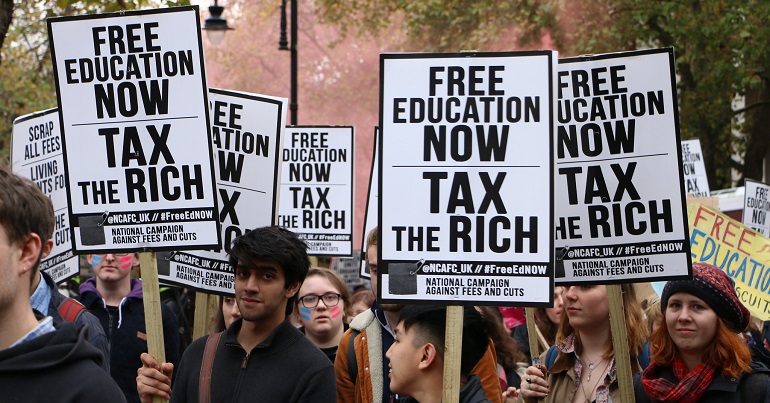THOUGHTS FROM THE FRONTLINE OF MARKETISATION – BEYOND TUITION FEES #3

It is a time of extraordinary potential for change in UK Higher Education. Labour’s promise to end tuition fees has defied the critics and united many behind Corbyn’s political project. But what will the implications for universities be if this comes to pass? And what can we do to leverage this progress? In this series, the Norwich Radical and Bright Green are bringing together perspectives from across the sector to explore these questions.
CW: Mentions suicide
It’s common for arguments in favour of free education to be dismissed as abstract or utopian, and for students who promote it to be belittled as naïve. I fear that in our attempts to try and portray the significance of free education, we have fallen into a trap where the concept has become so expansive and broad, and the term so overused, that it has lost all meaning. We need to move away from talking about ‘free’ education, and towards articulating a vision more explicitly centred on ‘state-funded’ education or ‘public’ education. For me, the description ‘free’ makes the concept feel distanced from the viable possibility of education funded through public taxation, and does us no favours in making it reality.
The real crux of the ‘free’ education debate is that it is only once the general public is fully convinced that Higher Education is of public value that it will become reality. We need to be brutally honest with ourselves here and acknowledge that there are many members of the public who do not see HE as of value to wider society, a narrative that has been fed by the Conservative government’s ‘value for money’ agenda over the last seven years.
I was lucky enough to be raised in a household where my mother, who never received a higher education qualification herself, was an ardent advocate for free education and its value in society. That being said, even I struggled to be fully committed to the free education cause for most of my undergraduate degree. A Masters and two years as an Education Officer in a Students’ Union later, and my scepticism has completely dissolved. I have never been more convinced of the case for publicly funded education.
When I started as an Officer, the Conservative’s White Paper Higher Education: Success as a Knowledge Economy had only just been passed. Two years later we have the Teaching Excellence Framework, the Office for Students, and the creation of UK Research and Innovation which has restructured the allocation of research funding. For me, free education isn’t about trying to argue what HE beyond fees could look like per se, but instead to reveal what the current reality of HE is while fees exist. Rather than try to describe in the abstract why I feel so passionately that free education is the only option going forward, why the marketisation of education is damaging to all members of society, and why SUs must not be fooled into thinking that the solution is to provide students with new ‘consumer’ power that gives them control over their education, I want to explore the concept of free education through a series of seemingly unrelated and benign events I have encountered during my two years as an SU Officer.
A Course Closure
In my first year of being an Officer I dealt with UEA’s closure of all postgraduate person-centred counselling courses. An entire cohort of students were told they could not finish their MA qualification, and the local community lost hundreds of hours of free counselling from these counsellors in training. The university had decided that the courses did not have the right type of value – financial value. They weren’t loss-making courses by any means, but nonetheless UEA were incentivised to scrap these small specialist courses in favour of large-scale streamlined courses that maximise profit margins. No thought was given to the importance of education itself in this decision. The whole idea of educational value has become skewed. Out with the student who wants to go on to provide counsel to adults with disabilities. Out with the student who wants to prevent male suicide. All in the name of profit.
The current HE model sees the failure of institutions as a sign that the market is functioning. The government has made it clear that they won’t bail institutions out. Many students will have to face these disastrous collapses in the future. In theory the ‘student protection plans’ required by the White Paper will prevent students being left stranded and chewed up when courses close, but the reality is that Universities just won’t run the small, specialist, and highly valuable courses that require them to have a student protection plan in the first place. When you run as a business, you don’t put plans in place to mitigate risk, you simply remove the risk.
This was the moment that I realised profit-driven institutions can’t be morally rationalised into protecting their ‘customers’, and that regulation or policy definitely can’t make them see the human impact of what they do.
The Great Strike
During the UCU industrial action it was saddening to see a lot of students demanding refunds for their education, intensifying the debate about whether students now view education as a purchasable product. Part of me wanted to laugh – universities had treated the students as customers when it suited them, had used them as a commodity, and now it was biting them in the ass.
Some within SUs wanted to use the opportunity to build a portfolio of consumer rights-style case studies, which was hard to oppose given the numbers of students coming to Union Advice services with such claims. This is perhaps what frustrates me most about consumer-focused HE – the SU is strong-armed into becoming the administrator for the marketisation of Higher Education. A wise PhD student once described what we were becoming as a ‘glorified customer complaints’ outlet. In this dynamic, SUs begin to view students as individual cases, failing to coordinate them together in collective action, which should be a Union’s primary purpose.
A Conversation with a Student Staff Member
One day, after the picket, I was talking to an international member of student staff about student requests for refunds due to strike action. As a law student with experience in the area, she said she didn’t understand why some SUs felt that utilising the customer complaints angle would revolutionise student power. “Businesses never care about the customer once they’ve bought the product. No one cares about the customer,” she said. “In fact, the majority of law cases demonstrate this, and most market regulators are actually incredibly powerless.”
A Meeting with Student Reps
About a month ago I met with some of our school convenors and listened to their opinions on the post-18 education funding review which has been proposed by the Conservatives.
Some of our humanities students were particularly upset by the number of contact hours they received for the tuition fees they paid. There was a sense of resentment in the room towards the science students who received subsidised field trips. The chronic underfunding of some subjects, combined with a constant political narrative that some subjects deserve more funding than others, has done nothing but breed resentment between students. Education has become defined by arbitrary resource allocation.
When we discussed fees varying between degrees, dependent on graduate earnings, or even on the value that the graduate degree holds for the wider economy or society, I was surprised at the response. These students expressed a great sense of discontent about who gets to decide what is of value, and anger about some external force devaluing their personal experience of education.
We turned our attention to the purpose of the TEF, which is intended to demonstrate the different ‘value’ between degrees by illustrating potential student outcomes through metrics, set standards of value that the students had previously protested. One convenor gave a scathing, absurdist vision of a future where there would be a ‘Compare the Market’ for degrees, not realising that this is now effectively already in place through the Office for Students and TEF.
A TEF Submission
I continue to be shocked by how expectant my university was that the SU would contribute quotes to TEF submissions during the school-level pilots. I won’t go into the technical detail, but I do want to address the idea that TEF motivates institutions to reflect on teaching practices and develop education for the better. I have sat in several university meetings where Teaching Excellence Plans were being designed, not because there was any interest in using them, but purely so they could be written into the TEF submission. Asking universities to fill out a form to enable ‘teaching excellence’, results in universities that get very good at filling in forms, and not much else.
A Bought Blog
One week the university offered to pay to use SU social media to promote postgraduate courses to students. The idea that the Union, the body in place to hold the University to account, would become a marketing arm for them was laughable, I thought. But it didn’t stop there. They also requested to buy a blog in my name to promoting the courses on offer. As much as it would be amusing to pretend to be a corporate lobbyist for a day, I didn’t quite have the stomach to sell out. If even universities themselves really think that SUs would ever serve this function, I dread to imagine what students think of us.
The Treatment of Associate Tutors
After a year of researching the experience of PhD Associate Tutors at UEA, and lobbying against precarious contracts in HE, I was contacted by a member of academic staff who had concerns about her Head of School. The Head of School, a member of UCU, was encouraging their ATs to cover additional teaching outside of their contracts, and had explicitly stated that they should not be paid. The Head of School had been so pressured by budget cuts that they had compromised their ethics. In a climate of new ‘streamlined’ courses that are composed of small insecure contracts of team-teaching, even fellow staff become viewed as a resource. There is no amount of lobbying or shaming that can prevent this type of behaviour. It will only end once courses are no longer run for profit. Until then, Universities will keep contracts unstable so that it’s easy to remove staff at the drop of a hat, in the name of financial necessity, causing staff to see each other as competitors in a system of insecurity and even Heads of School to treat their own as a commodity. A funding model based on individual consumers does not drive up standards, it compromises them.
For me, the case for publicly funded education shouldn’t just focus on the wider value it has for society as a whole which has been quantified time and time again. I’ve opened the door and seen what a marketised version of Higher Education looks like, and it’s not anything like what Higher Education should be. Adequate funding of universities through public taxation will allow HE institutions to make decisions based on their original purpose – to create an educational process that benefits society as well as the individual. Many of the issues students and staff alike lobby against in HE are mere symptoms of a system that has become compromised because of fees. The ability of both students and staff to critically think, not just within their academic fields, but about HE institutions themselves, cannot develop until decision making is liberated from dependence on fees.
If you’d be interested in contributing to this article series, contact either thenorwichradical@gmail.com or front-desk@project1-hvznj9e2s8.live-website.com with an article pitch.




Leave a Reply